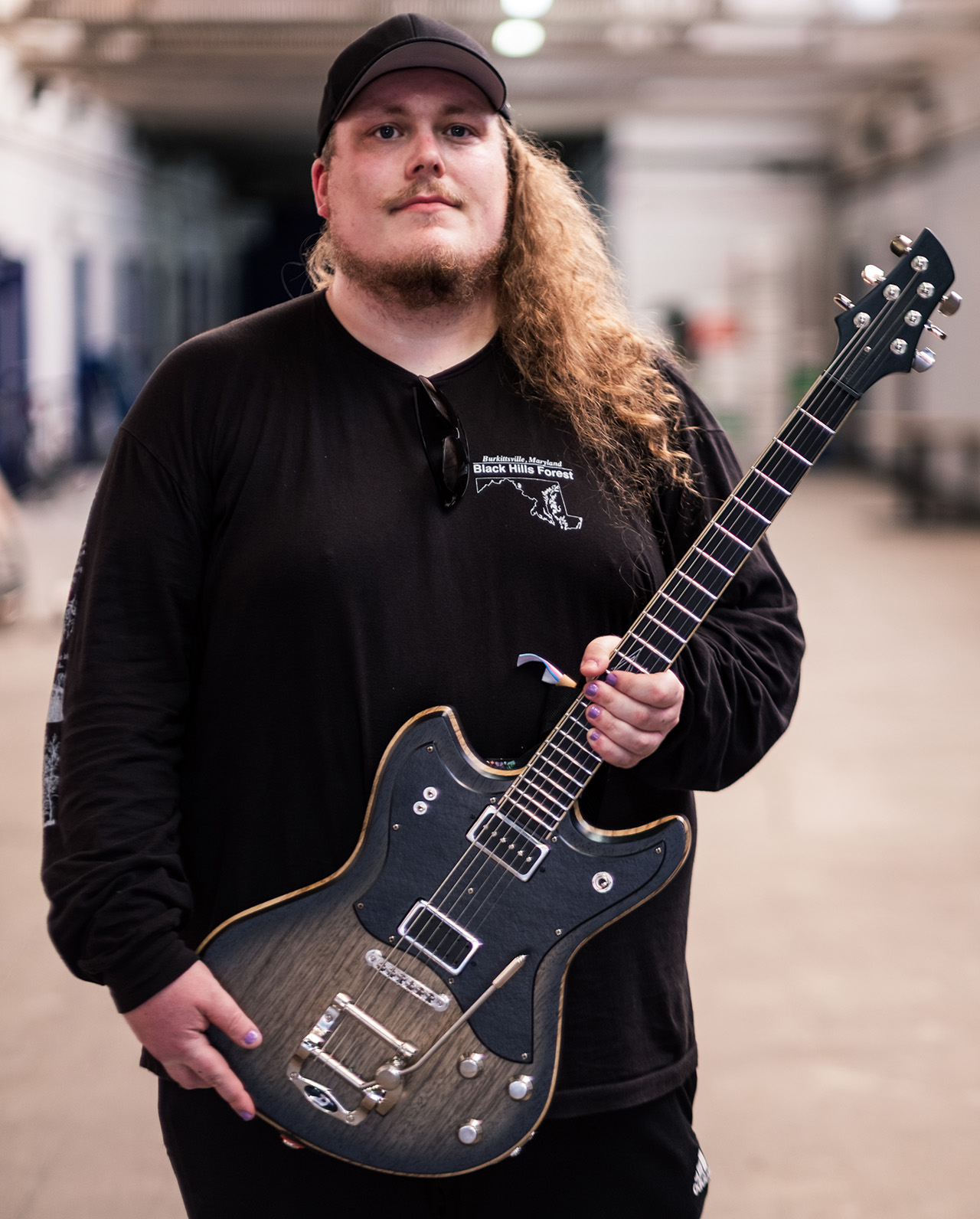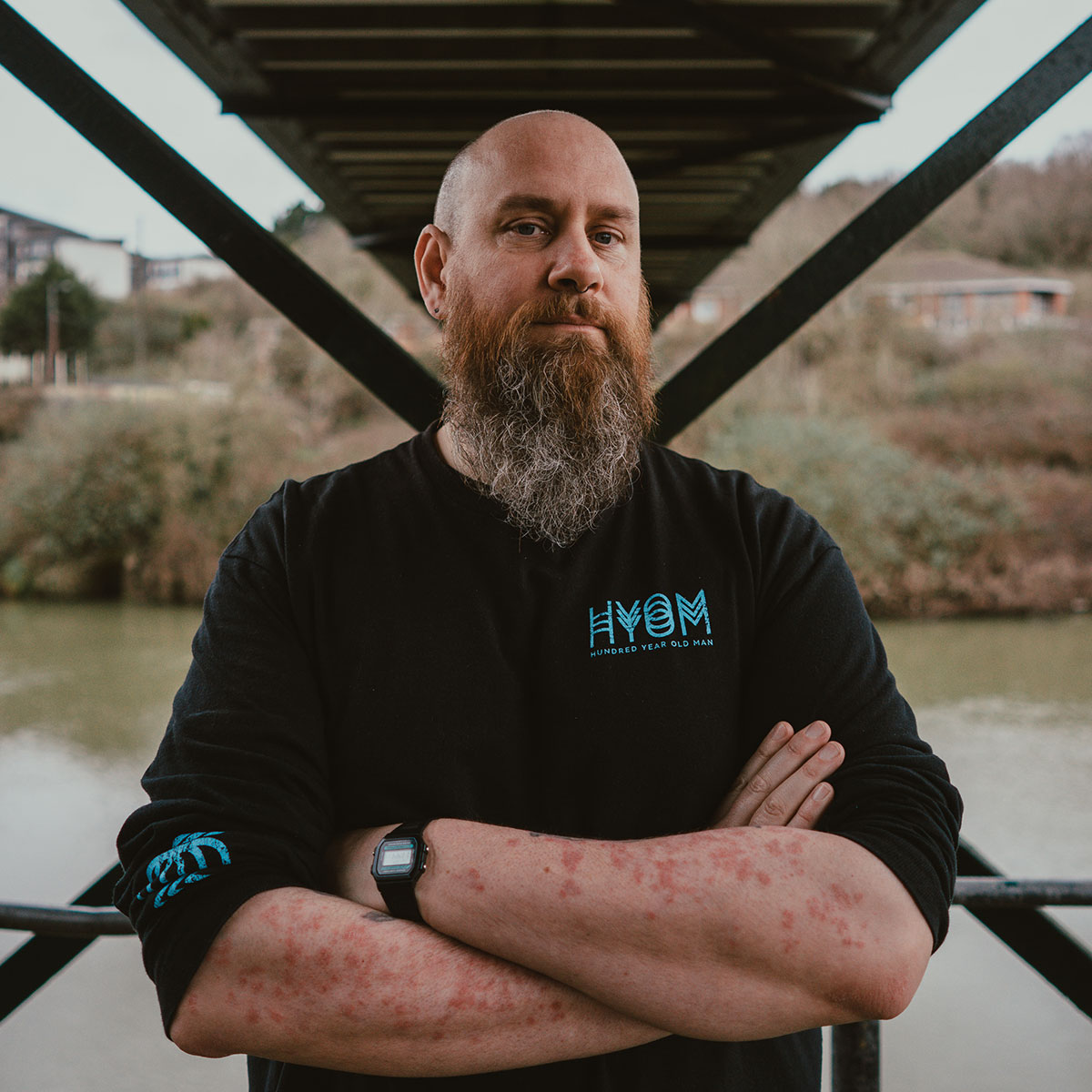“Changing from active to passive was huge – I’d forget to change the batteries and have a meltdown pre-gig when my EMGs died”: Conjurer just dropped a modern sludge-metal classic – and they made it using custom guitars with satanic scale lengths
The UK progressive sludge-metallers are one of UK heavy music’s most potent forces. Dani Nightingale and Brady Deeprose break down their Carillion and Mozer guitars, and why they write material using Guitar Pro – then send the tabs to their fans

Longtime fans of Conjurer’s anguished sludgy sound might be surprised by Unself’s vulnerable acoustic opener, a cover of century-old gospel ballad The World Is Not My Home.
Dani Nightingale explains: “Being neurodivergent and queer, I’ve never really felt at home in this world. I’d always play and sing it to myself backstage; it’s been a very comforting song – like maybe things will be better in another time. I love its warring hopefulness and despondency.”
Conjurer still cite Converge, Mastodon and Armed for Apocalypse as their biggest influences, but Nightingale also credits the genre-blurring inspiration of Agriculture.
“They sometimes barely sound like a black metal band – they bring in all these country and transcendental folk elements.”
Guitarists Nightingale and Brady Deeprose sat down with GW to discuss their latest album and their new custom instruments.

What other inspirations can we hear on Unself?
Deeprose: “Our records might have 50 touch points inspired by other bands – Gratefuls, Cult of Luna, Jim Geddy, Chat Pile, Baroness, Amenra, Yashira, Giles Corey or Have a Nice Life – but those sections will sound nothing like them. It’s not about copying those bands’ sounds. We just love that they have their own thing. We’re digging down into what makes our band unique.
All the latest guitar news, interviews, lessons, reviews, deals and more, direct to your inbox!
“It sounds like wanky musician talk, but our music is more honest than it’s ever been. Bands can lose their zest over time, but we’re a decade into our career and I’ve never been more excited about music we’ve put out than now.”
Did you trial any new gear for the record?
Nightingale: “On Pathos (2022), we were recording mid-lockdown, so we used what amps we had: Brady’s Engl Powerball and my EVH 5153. But our producer, Joe Clayton, has a bunch of different amps and cabs in his studio, so there was more swapping things in and out.”
What about guitars?
Nightingale: “We both got new customs: Brady got a Carillion and I got a Mozer. Mr Mozer showed us some guitars at a festival in the Netherlands. I couldn’t help but get myself one. It’s an Antholite with a Duesenberg Tremolo. It’s great – but the guys had to come down on me for overusing it! I wanted country dives on all the clean parts and they were like, ‘Just play it straight, man!’”

Deeprose: “I used to play an ESP V and I systematically destroyed it over eight years of touring. Chris from Carillion had been hitting me up since 2020, so for the new record, I told him: ‘You need you to build me an absolute workhorse.’
“It’s based on the King Slayer V, with a white Limba body and Wenge neck. 26.5in is on the shorter end of the baritone scale, but after an adjustment period it’s so comfortable to play.”
Was scale length a consideration on the new builds?
Nightingale: “Our old tuning, with the top five strings in C# standard and the thick bass string at G#, was really awkward for intonation and string tension. 24.75in guitars couldn’t handle the tension but baritones were too long. I have a Classic 6 from Jericho, whose standard length is 25.75 – the perfect length between standard and a baritone.”
“When we were looking into custom builds, we went for those in-between ‘extra-long regular’ or ‘shorter-scale baritone’ lengths. It’s very nerdy and a lot of people won’t give a shit, but for tuning and tension it’s been perfect. My Mozer is a 26.2in scale. The reason for the unusual number is that it’s 666mm – so I had to have that!”
What about pickups?
Nightingale: “I’ve got a Hyperion humbucker in the bridge and a P90-Bucker in the neck.”
Deeprose: “I’ve been using Bare Knuckles for five or six years; they make the best pickups for heavy music. I’ve got a VHII in the neck and a Nailbomb in the bridge of the Carillion. Changing from active to passive was huge, too – I’d forget to change the batteries and have a meltdown pre-gig when my EMGs died!”
You share your Guitar Pro tabs online for fans to buy at whatever price they want. How did that start?
Deeprose: “From the jump, Dani and I would write with Guitar Pro, send ideas back and forth and tab everything out exactly as we wanted it. The thinking was, ‘If you can make a banger on Guitar Pro with the crappy guitar synths and programmed drums, it’s going to sound insane when we record it!’”
Nightingale: “I came from the UltimateGuitar.com community, where you’d search for a song and either there’d be nothing or the tab would have two stars. It was always a great feeling when someone had put in the effort to tab up a song you wanted.

“I used to do it in WordPad or jot things down at work. My bag would be full of scraps of paper with riffs, time signatures and reminders to ‘record this when you get home!’”
Deeprose: “Every guitarist has had the frustration of finding a crap tab, or the band’s tab book is £100. We have the tabs, so we want anyone who wants to spend the time to learn our music to have them. If they want to pay for that, great, and if they don’t, that’s also fine. Bottom line: it’s nice!”
Did you hit any bumps when tabbing your parts?
Deeprose: “We recently went back and did the tabs for our first EP, as they weren’t finished at the time.”
Nightingale: “You had to ask me what your solo was.”
Deeprose: “I got there though – I knew roughly where the notes were, but we hadn’t played it in years. I found a video of us playing it in Plymouth, which was very helpful!”
- Unself is out on now via Nuclear Blast Records.
Dan discovered guitar in his early teens – playing every day on a sunburst Les Paul copy he still regrets selling – and has never stopped. He studied English at Cambridge then spent several years working in Japan, addicted to karaoke and manga. His fiction, music journalism, essays and translations from Japanese have appeared in Granta, The Guardian and The Quietus, among others. He plays a battered but cherished Thunderbird in progressive sludge-metal band URZAH.
You must confirm your public display name before commenting
Please logout and then login again, you will then be prompted to enter your display name.


![B.B. King [left] cups his hands to his ear as he asks the crowd for more. Joe Bonamassa, with a Les Paul, gives his crowd a thumbs up](https://cdn.mos.cms.futurecdn.net/P3XrQLh86C27JfPp4AGp6n.jpg)